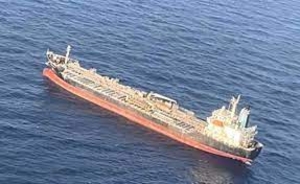Daniel Pipes, historian and director of the Middle East Forum, discusses the Middle East beyond Israeli reprisals in Syria and clashes on the border with Lebanon. The Red Sea and beyond strikes him as a place of strange developments. What struck him last week, when escalation became more concrete, was "the attack from Iranian territory against a Japanese ship in the Indian Ocean."
 The MV Chem Pluto, struck by a drone from Iranian territory on Dec. 23, 2023. |
Why strange?
"Because it is an action in international waters conducted by Tehran, not [as usual] by its agents. The U.S. government itself says so."
Do you think there will be a response?
"I think Washington has no other choice, but I don't see any signs of that at the moment."
What message is Tehran sending by intensifying its operations?
"Washington is trying in every way to avoid a direct conflict with Iran, but the Iranians are becoming more and more aggressive; avoiding a U.S.-Iran confrontation is becoming increasingly difficult. In the Red Sea, the Houthi militia's actions are provocative, the attack in the Indian Ocean makes that too a theater of confrontation. Someone in Tehran seems to want a fight."
Does that surprise you?
"Yes, as we have become accustomed to attacks only by Tehran's agents – Hamas, Hezbollah, the Houthis, the jihadi groups in Syria and Iraq. But now the Iranian regime itself is engaged, striking an international trade route, no less. Either it does not understand the dynamics of international politics or, as I said before, someone wants a fight. Both those explanations are anomalous for the Islamic Republic."
How much do regional militias aligned with Tehran depend on it for operational capabilities and objectives?
"Profound differences characterize these militias in terms of their dependence on Tehran. Some do not fit exactly into the Iranian agenda. All of them have, to one extent or another, autonomy. They raise their own funds, train their own fighters, pursue their own goals. None simply obey Tehran's orders."
U.S. Secretary of State Antony Blinken travels to Israel again next week. There are many issues on the table, from the fear of regional escalation to pressure on Netanyahu to reduce the military campaign in Gaza by opting for more surgical actions, thus reducing the number of civilian deaths in Gaza. Will the Israelis give in to U.S. pressure?
 Secretary of State Tony Blinken and Israeli Prime Minister Benjamin Netanyahu in Tel Aviv on Oct. 12, 2023. |
"[Telling Israel how to fight] is a highly unusual request. Did Washington tell the British what to do in the Falklands? Or France in West Africa? No, because that would have been a mistake. We normally leave allies the freedom to decide, on a tactical level, what to do and how to conduct a conflict. Turned around, we Americans did not appreciate it when Swedes and others told us what to do in Vietnam."
Netanyahu and Biden also have a profound difference in views on the post-conflict and on the role of the PA in Gaza. What do you think?
"It is simply absurd to leave the Palestinian Authority in charge in Gaza. There are at least two reasons: First, [PA President] Mahmoud Abbas did not condemn the Hamas attack and also he is too weak to govern Gaza. Second and most important, Israel would to best to work with anti-Hamas Gazans to create a local administration and police force. A deep-rooted and widespread hostility against Hamas exists in Gaza, meaning there exists a readiness to work with Israel once hostilities are over."
They can govern without the PA and without Arab countries?
"Israel can and must work with the inhabitants of Gaza. They do not need Arab or Western powers."
Is this a path to a two-state solution?
"I have nothing against the two-state solution in theory but it is an absurdity now[, before Palestinians have accepted the permanent existence of the Jewish state]."